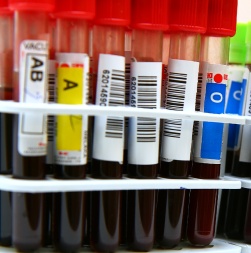Genetic testing and counseling
The genetic test serves to understand in more detail that person’s risk of developing cancer.
The test aims to identify the specific mutation(s) causing colorectal cancer in that family, what has practical implications for the prevention of the disease in the future.
Testing those family members most likely to carry the mutation not only identifies those that have it so they can be regularly monitored, but also reassure those that do not carry it.

This is especially important for the children of individuals with FAP, who should be closely monitored by regular proctoscopy (endoscopy of the colon and rectum) from very young age (10-12 years old).
Genetic testing is not obligatory – the test is always accompanied by genetic counseling and only with the individual’s consent.
Contrary to common belief, the test is neither quick nor always conclusive.
In the section Teste genético , learn more about the test: who should do it, how it is done, what are its limitations and how to interpret the results.




